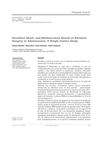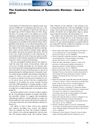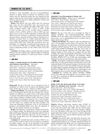 9 citations,
October 1988 in “Clinics in Dermatology”
9 citations,
October 1988 in “Clinics in Dermatology” Hair loss is caused by genetics and hormones, diagnosed through examination and biopsy, and treated with medications or surgery.
 1 citations,
April 1976 in “Archives of Dermatology”
1 citations,
April 1976 in “Archives of Dermatology” Sudden weight loss can cause significant hair loss, and using colchicine on the skin for psoriasis may be unsafe.
 July 1975 in “Archives of Dermatology”
July 1975 in “Archives of Dermatology” The document suggests a possible connection between rapid weight loss and hair loss, and reports a case of skin condition improvement after stopping acne medication.
 5 citations,
January 2015 in “Current problems in dermatology”
5 citations,
January 2015 in “Current problems in dermatology” The document concludes that a thorough history, physical exam, and specific tests are crucial for diagnosing and managing hair loss effectively.
 8 citations,
January 2019 in “Chirurgia”
8 citations,
January 2019 in “Chirurgia” Bariatric surgery is safe and effective for treating adolescent obesity.

Improved nutrition quickly healed the patient's skin lesions.
 January 2017 in “Springer eBooks”
January 2017 in “Springer eBooks” Over 40% of postmenopausal women experience hair loss, with treatments aiming to stop further loss and possibly thicken hair.

Eating more protein during weight loss can prevent hair loss caused by not having enough protein.
 97 citations,
October 2019 in “Journal of Translational Medicine”
97 citations,
October 2019 in “Journal of Translational Medicine” A very low-calorie ketogenic diet is effective for quick weight loss and improving health in obese patients, with careful management of side effects and maintenance.
 12 citations,
January 2009 in “Gynecological Endocrinology”
12 citations,
January 2009 in “Gynecological Endocrinology” A postmenopausal woman's hair loss and excess hair growth improved after surgery for ovarian hyperthecosis.
 104 citations,
November 1978 in “JAMA”
104 citations,
November 1978 in “JAMA” The Protein-Sparing Modified Fast is effective for rapid weight loss and maintaining it, but requires medical supervision and can have side effects.
 2 citations,
March 2011 in “Infertility”
2 citations,
March 2011 in “Infertility” The conclusion is that lifestyle changes and weight loss are first-line treatments for infertility due to anovulation, with various medications and assisted reproductive technologies as additional options.
 2 citations,
January 2017 in “Cambridge University Press eBooks”
2 citations,
January 2017 in “Cambridge University Press eBooks” Manage PCOS in primary care with weight loss, psychological support, medication, and monitoring for health risks.
 39 citations,
March 2009 in “Clinics in plastic surgery”
39 citations,
March 2009 in “Clinics in plastic surgery” Injection lipolysis effectively reduces small fat deposits and should be done with care and proper patient selection.
 August 2012 in “Journal of Evidence-Based Medicine”
August 2012 in “Journal of Evidence-Based Medicine” The issue included new and updated reviews on various health interventions, with significant findings on weight loss, psychological therapies, cancer treatment, and more.
 February 2005 in “The Journal of Urology”
February 2005 in “The Journal of Urology” Finasteride for hair loss doesn't harm erectile function; weight loss and exercise improve it.
 9 citations,
April 2021 in “Evidence-based complementary and alternative medicine”
9 citations,
April 2021 in “Evidence-based complementary and alternative medicine” Guilu Erxian Glue may help reduce chemotherapy side effects like weight loss and heart stress.
 April 2016 in “Plastic and reconstructive surgery. Global open”
April 2016 in “Plastic and reconstructive surgery. Global open” The supplement highlighted advancements and challenges in plastic and reconstructive surgery, including the impact of smoking, chemotherapy, and new treatments like Tafluprost for hair loss.
 2 citations,
October 2015 in “Primary Care: Clinics in Office Practice”
2 citations,
October 2015 in “Primary Care: Clinics in Office Practice” Doctors should diagnose hair loss by examining the patient and possibly doing tests, and then treat it based on the type, which may prevent permanent hair loss.

Minoxidil is better for female hair loss without hormonal issues, cyproterone acetate for those with; people with treated congenital heart disease have lower life quality; personality differs in types of infertility; oral terbinafine is best for toenail fungus; bladder training reduces incontinence; nurse clinics help with heart disease; weight loss improves body composition and liver disease; computer training cuts drug errors.
 June 2016 in “American Journal of Cardiology”
June 2016 in “American Journal of Cardiology” Endovascular repair and open surgery for abdominal aortic aneurysms both result in a temporary decline in physical health, with no significant mental health difference, and a return to near normal health in 90 days.
 90 citations,
January 2021 in “Clinical Endocrinology”
90 citations,
January 2021 in “Clinical Endocrinology” Obesity increases the risk of developing polycystic ovary syndrome, and weight loss can improve the condition.
 9 citations,
November 1978 in “Diabetes Care”
9 citations,
November 1978 in “Diabetes Care” The document concludes that a high-protein, low-carb diet can lead to significant weight loss but requires caution and further research.
 30 citations,
April 1997 in “European journal of endocrinology”
30 citations,
April 1997 in “European journal of endocrinology” The document concludes that managing hirsutism involves identifying the cause, using a scoring system for severity, combining cosmetic and medical treatments, encouraging weight loss, and providing psychological support, while noting the need for more research on drug treatments.
 4 citations,
July 2017 in “Medicine”
4 citations,
July 2017 in “Medicine” The document concludes that managing PCOS involves lifestyle changes, medication for symptoms, and weight loss for fertility improvement.
December 2022 in “Journal of Sulaimani Medical College” Sleeve gastrectomy leads to significant weight loss and health improvements with few complications.
 September 2024 in “Journal of the American Academy of Dermatology”
September 2024 in “Journal of the American Academy of Dermatology” Semaglutide does not significantly increase the risk of hair loss.
 18 citations,
January 2015 in “Journal of obesity and weight loss therapy”
18 citations,
January 2015 in “Journal of obesity and weight loss therapy” Eating less starch and dairy helped overweight women with PCOS lose weight and improve symptoms.

Polycystic ovary syndrome (PCOS) affects about 10% of women, is often linked to obesity and family history, and can cause irregular periods, fertility issues, and other symptoms. It's usually managed with lifestyle changes, weight loss, and medication.
514 citations,
February 2011 in “International journal of women's health” Different treatments for PCOS focus on the specific symptoms, with weight loss and lifestyle changes being important.




























